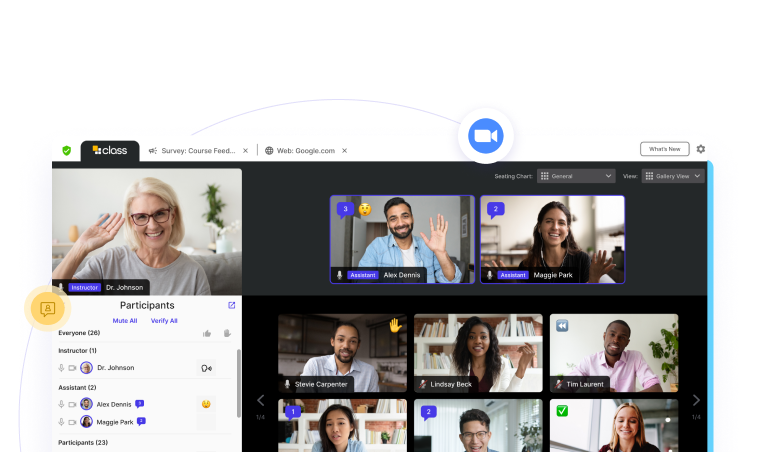
Mike Lovell is the SVP of Marketing at Class. He has dedicated his career to technology and the applications that can innovate the way people live and learn.

Mike Lovell is the SVP of Marketing at Class. He has dedicated his career to technology and the applications that can innovate the way people live and learn.

As the demand for hybrid and online coursework continues to skyrocket amongst learners of all ages, institutions are met with the challenge of ensuring students are given all the tools necessary to succeed. In addition to quality faculty, capable technology, and other known entities, institutions must consider how to build community engagement online, as this is an essential factor in learner success.
In a recent Times Higher Education study, 78 percent of students surveyed wanted up to half of their coursework delivered online. 65 percent of students in that same survey pointed to the flexibility to choose remote or in-person delivery based on the course as highly advantageous.
McKinsey has seen a positive correlation between institutions offering quality online programs and institutional growth. It has become evident that students want online coursework offered and that institutions that do so effectively see growth. With an impending enrollment cliff on the horizon, institutions with strategies for online learning stand to benefit tremendously.
We recently convened three experts in online classroom management strategies for higher education to discuss the continued boost in virtual coursework demand, as well as the importance student engagement plays in its success. An eLearning Industries report noted that students were five times more engaged when they had an online course that included an online community component and sixteen times more likely to finish the course.
Brian Jones, Associate Vice President of Institutional Effectiveness for Odessa College, points out, “We know that our learners come to us from different backgrounds, but the part about community is understanding the diversity of the different cultures and perspectives. So, I think as facilitators, we have to be mindful of that. And, I think that community comes in when we’re intentionally building those engaging opportunities for motivation and where [students who are] practicing in those class discussions and those activities have a direct connection to what they’re going to be doing […] We need to focus on what’s engaging, what’s relevant to them, and how we can make the connection to what’s happening in the real world.”
Matt Franz, Senior Vice President of Technology, Safety, and Strategic Initiatives at Clark State College, adds, “I think that being in a room or being online and seeing other people, hearing them talk, that’s an important piece that [can be] missing. We’re continuing to really try and leverage [that element] as we reinvigorate what our online courses are meant to be.”
In discussing the importance of engagement and its impact on student success when online learning communities exist, our panel provided some immediately impactful ideas.
James Hayes, Director of Educational Technology at Ashland University, shares, “I think our number one [focus] across our programs is to use learning cohorts. So, we have people going into specific programs and it’s a group of learners. It’s year by year, especially if it’s a multi-year program, and it’s people who [have] a shared interest going across the same group of classes together.”
Hayes continues, “When it’s just a group of strangers that you’re there for a couple of months versus if you’re studying over the course of a couple of years across online classes, that definitely helps develop deeper, stronger bonds with people who share specifically the same interest, the same goals, the same educational objectives. That’s definitely going to foster more engagement and more interaction.”
Jones adds, “There are many different tools that you can use to ensure the cooperative learning groups occur: breakout rooms, mind maps for brainstorming, pulling them together where students are specifically assigned to tasks or topics and then they collaborate on designing and coming back together. There are many different instructional strategies out there to facilitate the cooperative learning…Putting a student in a group doesn’t necessarily quantify as high-quality engagement. What is the student-specific, content-specific language? What’s the academic language being used in those conversations? Because again, if they’re in groups, we do have to drop into those groups to see and to ensure that the rigor is appropriate for the outcomes.”
As technological advancements have made strategies for online learning far more academically robust, it’s important to note the impact quality educators still play in successful student outcomes, from academic to personal.
Jones says, “We have to think about groupings and using technology tools to accelerate processes, not to [replace]. Putting them in a group alone is not going to answer the question…One of our major focuses right now is just ensuring that both faculty and staff have the professional development that they need…But, it’s just about providing faculty with better and more opportunities to really learn.”
Ensuring that students have the opportunity to learn with an effective online classroom platform, that educators have the proper training to leverage the vast features and capabilities these platforms now provide, and leveraging the mix of both to establish online community engagement puts everyone in a place of success.
The vital importance of community and engagement in the learner experience must translate into the online environment. Ensuring that online courses are crafted intentionally and that educators receive proper training to develop effective opportunities for both personal engagement and learner communities will help institutions not only offer coursework in demand by their student populations, but see them complete the classes successfully.
Ready to see how Class can help your institution take its online coursework to the next level with best-in-class features and training to heighten learner engagement and student communities? Reach out to a Class team member today.

Mike Lovell is the SVP of Marketing at Class. He has dedicated his career to technology and the applications that can innovate the way people live and learn.

Mike Lovell is the SVP of Marketing at Class. He has dedicated his career to technology and the applications that can innovate the way people live and learn.
Get our insights, tips, and best practices delivered to your inbox

Sign up for a product demo today to learn how Class’s virtual classroom powers digital transformation at your organization.

Features
Products
Integrations